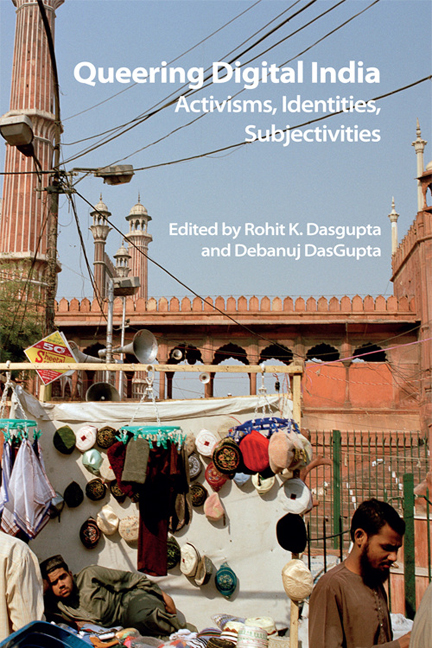2 - Queering Digital Cultures: A Roundtable Conversation
Published online by Cambridge University Press: 28 April 2021
Summary
Rohit and Debanuj: In this roundtable we discuss the role of digital cultures and ‘queering’ them in contemporary India within the backdrop of Section 377 (see Introduction), which frames the dominant legal discourse on sexual rights in India. This roundtable brings together academics and activists: Dr Niharika Banerjea whose research and teaching interests are in the areas of queer activisms, transnational feminisms and collaborative ethnographies. She is a member of Sappho for Equality, one of the organisations working with Lesbian, Bisexual women, and Trans men in Eastern India. Dr Aniruddha Dutta who works on non-metropolitan working-class networks of Kothi, Hijra and transgender communities; Dr Amit S. Rai who is both a media philosopher as well as an organiser and founder of the autonomous Tech fetish Group in East London, Jack Harrison Quintana, who is currently working with Grindr for Equality, the human rights wing of the popular gay dating app Grindr, and Professor Radhika Gajjala, a feminist researcher of digital media spaces working on issues related to women and globalisation at the intersection of NGO-isation and IT-isation since the 1990s. Thank you all for agreeing to take part in this roundtable. At the outset we must say that we have purposefully not defined terms such as digital cultures, queer and queering for all of you. Instead, we are allowing your responses to uphold the diverse ways academics and activists conceive of digital technologies, digital spaces, queer as a marker for non-normative identity, and queering as different modes of doing gender and sexuality politics.
I guess we would like to start off this discussion with thinking about digital culture in our own lives and especially thinking about what has been the role of digital culture and digital technologies in the last few years in the various groups that we currently work with.
Niharika: Let me first answer this question by thinking through the terms ‘digital culture’ and ‘digital technologies’. I do not have any scholarly expertise on these concepts, but am wondering if digital culture indicates that the use of certain technologies over time becomes part of a habitus, and/or cultural habit. And what are these technologies? Are they only limited to groups on the internet or can I include messaging services such as Whatsapp and email?
- Type
- Chapter
- Information
- Queering Digital IndiaActivisms, Identities, Subjectivities, pp. 29 - 53Publisher: Edinburgh University PressPrint publication year: 2018

